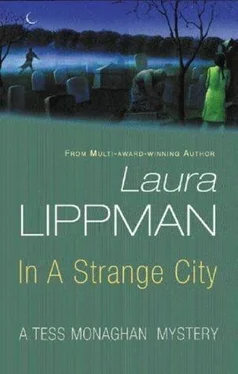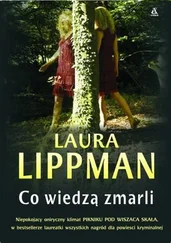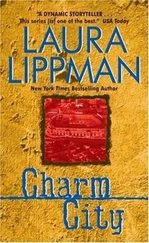“I don’t know why the bottle is half full,” Tess began.
“Hey, you said half full, and I said half empty. I guess we know which one of us is the optimist and which is the pessimist.”
Tess smiled wanly. Whitney had a terrifying self-confidence that made optimism superfluous. She assumed everything would work out for her. So far, everything had.
“Anyway, the Visitor, the Poe Toaster, brings a half-full-or half-empty-bottle of cognac to the grave site every year. From what I’ve been able to determine in my crash course in Poe, there’s no real significance to the drink. Scholars are bitterly divided on whether Poe could even tolerate alcohol in any quantity. And cognac, in particular, doesn’t figure in any of Poe’s stories. It’s not amontillado, after all. The best explanation is that it’s a toast, a form of tribute.”
“Do you think your visitor intended tribute?” Whitney’s tone was at once arch and concerned. Her voice, the clear, confident tone that only the richest people can afford, was often on the verge of self-parody but Tess knew she was genuinely interested. And genuinely worried.
“I don’t know. It felt creepy but not overtly threatening. Someone knows I was there the other night, that’s the creepy part. But-and here’s where I’m going to sound as if I’m really off the rails-I don’t think it’s a threat or a warning. Someone knows what I’m doing and wants me to keep doing it. The question is who.”
“The question is who.” Whitney tested the grammar and found it acceptable. “And why?”
“And why,” Tess agreed. “The man who tried to hire me? Maybe this was an elaborate psychological ploy- maybe he wanted me there that night as a witness so he lured me there by letting me think something bad was going to happen-but he didn’t strike me as bright enough to play such a complicated game, and I wouldn’t have been there if Crow hadn’t insisted.”
“Could he be the Visitor? Suppose he had gotten wind of the fact that someone else planned to be there that night and was worried about what might happen. Perhaps he was trying to tantalize you into protecting him.”
Tess had already considered this possibility. “No. No, it’s all too sloppy, dependent on too many variables. Besides, the man who got away, while he wasn’t as tall as the man who was killed, he wasn’t short. And he moved stiffly, while my little pig friend scuttles when he runs, like a crab who’s figured out how to go forward. I wonder if my visitor is Rainer, the homicide cop, playing another joke on me, trying to test me. I told you about the Norwegian radio reporter. I think he wanted to see if I would seize the spotlight for myself.”
“Tess-” Whitney had gotten as far as lifting her glass to her mouth, only to put it back on the table and grab Tess’s drink for a quick sip. “Hmmm. Their Cosmos are much limier than some. I like it. Anyway, at the risk of sounding bossy-”
“A risk you’d never take.”
“At the risk of sounding bossy, or as if I’m trying to run your life, what’s the point of all this? You tried to find the man who hired you because you didn’t want to give him up to an inexperienced cop. But he’s MIA, so there’s no likelihood of anyone’s finding him. Give it up, move on. You’re getting a little obsessive. I hate to take Tyner’s side in anything, but you do have to earn money. You have a house, a dog, and a boyfriend to support.”
“But the cognac, the roses-”
Like a child forced to eat a hated food, Whitney grabbed her glass, held her nose, and upended half the contents in her mouth. She made a hideous face, but she swallowed. “I’m sorry. I like martinis. I like blue cheese. But this is wrong. Did I resolve to finish every drink on the list or merely try it?”
“Just try it. So congratulations, Whitney. You’re the only person I know who has successfully lived up to the letter of her New Year’s resolutions before the end of January.”
“It’s simply a matter of knowing what’s realistic,” Whitney said, with her perpetually self-satisfied air. “You won’t catch me resolving to read some ridiculously difficult book”-Tess had been toting Ulysses around with her for the last year, as Whitney well knew-“or trying to better myself in some dreary, predictable way. Diet, exercise, yoga: how boring.”
“Is it even possible for you to be better?”
“Well, I can’t get any better at being me, that much is certain. And someone has to be me, and it might as well be me, don’t you think?”
“What I think,” Tess said, “is that a piece of blue cheese has gone straight to your brain and is blocking the passage of blood to an important artery.”
They ordered dinner, and she pretended to put aside all thoughts of Poe. Whitney had a new job, working at the foundation underwritten by her family’s fortune, and she seemed to be enjoying this one more than any of her previous incarnations, which included editorial writer, Tokyo-based financial correspondent, and Tess’s unpaid assistant. But even as part of Tess listened to Whitney’s sly and knowing gossip about Baltimore ’s cultural life, she was still thinking about the cognac and those snow-covered roses. Someone was watching her. Someone was expecting something of her. What? It was as if she had a ghost for a client, maybe Poe himself.
And this meant, she realized, that the likelihood she would be paid for her efforts was very small indeed. Poe had always been broke.
“It is funny, isn’t it?” Whitney said, finishing off a story, waiting expectantly for Tess’s reaction.
“Oh, yes,” Tess assured her. “Screamingly.”
Tess had a motto: Just because something is easy doesn’t mean it’s not worth doing.
It was a rule she had formed while still in the newspaper business, where she had watched other reporters rush out the door without reading clip files or even checking the address in the ADC map book. She called such manic bursts the inherent bias in favor of action, and she had learned to resist it. There was a lot to be said for sitting and thinking.
So she sat in her office the next morning, Sunday, and thought. She thought, looking at her roses, which she had propped up in a jelly jar, and occasionally uncapping the Martell’s for a quick sniff. It was head-clearing, reminiscent of the long-ago nights she had worked elections in the classified section and, in the service of scientific inquiry, opened the glue pot on the clerk’s desk between phone calls.
Mind and nostrils now open, she enumerated all the things she didn’t know.
She did not know who left her the flowers and the cognac. Common sense dictated this was a bad thing, and she should be fearful. Right now, however, with a bright sun working around the edges of the Venetian blinds and church bells ringing in the distance, she simply could not work herself into feeling scared or threatened. In fact, the flowers cheered her enormously. They were good roses, not the cheap kind that would die quickly. The gift felt like a tribute. Then again, so did the Trojan horse at first, didn’t it?
More items for her list: She did not know who the Pig Man was, although she knew he was a liar. She wondered if he had left the flowers and the cognac. She hoped not.
Meanwhile, there were things she did not know but could learn painlessly, things about Poe. She had made a head start there, dipping in and out of the books she had purchased, learning a little more of his work, about which she was woefully ignorant, and his life, about which she knew even less. Poe himself was the source of much of the misinformation, weaving fanciful tales about his biography while alive and then entrusting his legacy to a man named Rufus Griswold, who proved to be a more unreliable narrator than anyone Poe had ever created. It was, noted the biography by A. H. Quinn, as if Mozart had bequeathed his work to Salieri.
Читать дальше












